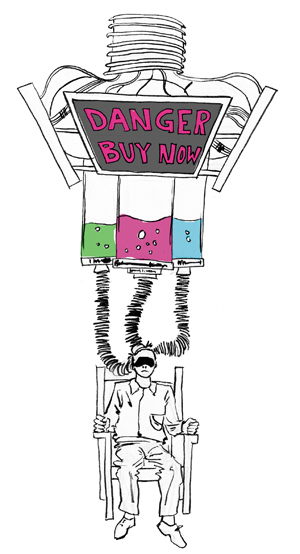
Your complimentary articles
You’ve read one of your four complimentary articles for this month.
You can read four articles free per month. To have complete access to the thousands of philosophy articles on this site, please
Books
Symbolic Misery: Volume 1: The Hyperindustrial Epoch by Bernard Stiegler
Daniel Tutt learns the art of winning an aesthetic war.
Greek philosophers pointed out that some political conflicts affect all aspects of social life, from the family to public institutions. They called this phenomenon of permanent political conflict stasis. Stasis is an interesting concept as it specifies conflict in two domains: family relations/private life (oikeios), and external social conflict (polemos). Contemporary continental political philosophers such as Giorgio Agamben, the radical anonymous collective Tiqqun, and Bernard Stiegler have also begun to invoke stasis as they seek to better comprehend the political conflicts that plague us today, from global climate change to states of economic emergency, to global terrorism. But perhaps the most common theme of these thinkers is that global society is undergoing stasis as a result of a permanent crisis at the heart of global capitalism. Some stress the aesthetic domain, that is, culture, as the location of this crisis, while others stress political economy as the source of the problem.
In Symbolic Misery: Volume I: The Hyperindustrial Epoch (2014), Bernard Stiegler introduces his theory of stasis as first and foremost an aesthetic war. This is not a war of bullets or direct violence (although it can grow into that). Rather, it’s a war of symbolic violence to human minds that results from the total dominance of the market over human consciousness. The stasis of contemporary life is a pervasive and universal psychic suffering or ‘misery’ brought on by the way in which our emotions are more and more culturally controlled, all the way down to the way that we form social meaning. In our contemporary ‘control society’, consciousness is no longer singular or distinctive – thought generally conforms to the dominant message. One consequence of this widespread inability to form distinctive consciousness is to be caught in a ‘retentional apparatus’ that reduces attention.

Culture Tower by Peter Pullen 2016
Image © Peter Pullen 2016. Please visit www.peterpullen.com
Today there is much talk about the attention economy, wherein each segment of our time is commodified and made eligible for the temporary attention of people as they, and we, tune into a social media or video clips, etc. Stiegler’s proposal is that the attention economy is emblematic of a much larger absorption of modes of production by the aesthetic sphere of human life (that is, the sphere of human perception: ‘aesthetic’ means ‘concerning perception’ in Greek). Stiegler calls this merger of economic production with the aesthetic sphere the hyperindustrial age. It’s the specific source of the misery we experience, and though some in our world will experience it to a greater degree than others, it affects us all. Our position in this sphere of culture and control is one where we are unable to form community – we are unable to unite across the various cultural and ideological divides that have only intensified around us. If Stiegler is right, we must accept that we are stripped by the hyperindustrial economy of our ability to form aesthetic attachments to things. This is a condition affecting all levels of class and privilege.
To unravel this isolating situation Stiegler turns to psychoanalysis, particularly to post-Lacanian and Deleuzian thought. Psychoanalysis holds that the formation of an interior ‘we’ within the self is necessary before that self can form a community with others. The movement towards the interior is what Freud calls ‘primary narcissism’, but it is a prerequisite for the self forming a bond with the wider community.
How do we get out of stasis? This is only the first volume of Symbolic Misery, so the question of political strategy is not dealt with in too much detail here, but there are some hints. Picking up from Aristotle, Stiegler proposes that stasis must be understood as an absence of philia. Philia is the word Aristotle uses for the basic friendliness and familiarity at the heart of social life, and Aristotle claimed that it is a necessity for civic life. Culture requires a constant engagement with or encouragement of philia, otherwise we run the risk of entering into a permanent stasis, or state of political conflict. For Stiegler, stasis is a political horizon that we risk falling into at any time.
Who then is the enemy of philia in our societies? The enemies of philia are a growing segment of the citizenry, whom Stiegler calls the ‘new barbarians’. He doesn’t name ISIS and al-Qaeda specifically, although they would probably qualify. The new barbarians are also found in the growing far right populist political parties and movements in so many Western countries.
Although there are nascent signs of fascism in their politics, Stiegler advocates a dialogue with them, drawing upon a common ground of suffering we all share. The originality of this proposal is that it shifts away from the very idea of an enemy who embodies an ideology, and instead, presents the modern condition as the enemy, which affects the entire body politic, especially those most precarious and dejected. It is they who are unable to form a necessary primordial narcissism, the type of self-love that is the requirement for the formation of community, as Freud described in Group Psychology and the Analysis of the Ego (1921). Yet for Stiegler, the formation of community is our last hope for fending off the stasis that lies at our gates, and it must step beyond partisan and ideological lines to truly bring philia back into the heart of civic life.
© Dr Daniel Tutt 2016
Daniel Tutt is Adjunct Professor of Philosophy at Marymount University in Arlington, VA.
• Symbolic Misery: Volume I: The Hyperindustrial Epoch by Bernard Stiegler, Polity, 2014, 128 pages, $20 pb, ISBN 978-0745652658









